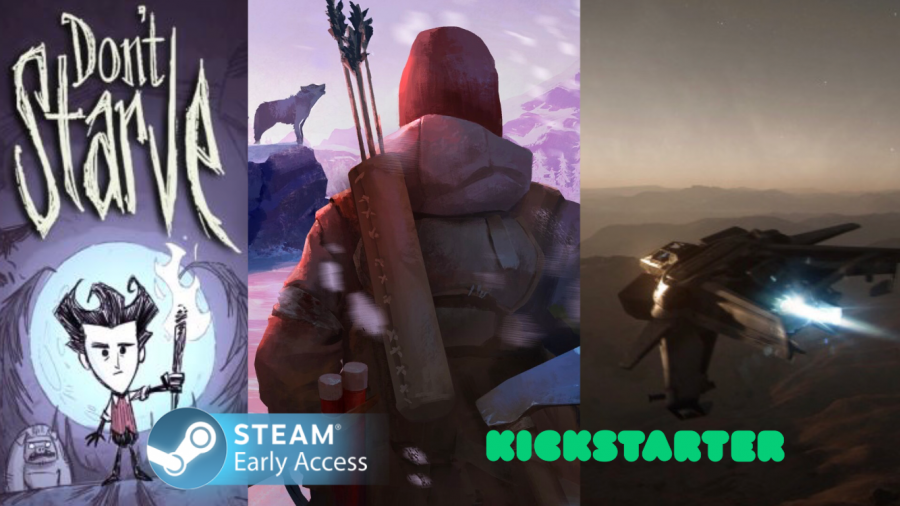The Inherent Risk of ‘Early Access’ and Investing in Video Games Early
Investing in something is almost always a risky idea. There’s always the possibility that something could go awry, and the business, product or person you’ve invested in could go under, leaving you with essentially no way to get your money back.
The idea of investing extends into video games and exists in the form of ‘early access’. This service allows prospective buyers of a game to buy it early, at the cost of the game being actively worked on, rather than fully done.
Early access has existed for several years now, and have become increasingly popular over the 2010s, with most early access titles appearing through Steam, an online store for buying games digitally.
On a surface level, early access seems like a good idea; give a person or team of people making a game the money early, in exchange for getting to play it before the final version is fully released. And in many cases, it can be a good idea.
Early access often seems to relieve some of the pressures that come with a Kickstarter campaign, in which an idea is presented and potential donors are given a pseudo-ultimatum of “donate a smaller amount now and get the game, but at the risk of the game never being finished”, or “save your money for when the game fully releases, but risk there not being enough donations, and the game isn’t made.”
While both are the same in terms of being a source of funding that comes from public investment, early access tends to lean more towards a ‘drip-feed’ method, with people seeing that the game is on the store and in early access, which may lead them to wait a while before buying it.
This means that the developer of the game can use the funding as it comes in, rather than a Kickstarter campaign in which a lot of money can be raised over a short period of time. These larger campaigns have time and time again led to the creator or developer of the proposed product ‘bailing’ on their backers, taking the money and vanishing.
To both Kickstarter and early access, risk is inherently infused with them. After all, you’re putting real, actual money down early on an in-progress product that often only has videos or still pictures demonstrating the product, over you actually being able to use the thing firsthand.
Sure, with early access, after paying the money, you can download and play the game, but even then, it’s not finished. You’re only playing an early version of what the game will probably end up being.
In early access, many games do often come out, ending up being exactly what they promised, or what was promised though maybe not as grandiose, or are complete shells of what was promised. However, there are some games that have been in early access for a very long time, becoming a money dump for hopeful people just looking to play a game that they were told would be the be-all, end-all for video games.
One such example is Star Citizen, a science-fiction game in which players can ostensibly live another life inside of a massive, digital universe. The promises of Star Citizen were always larger-than-life, but as the game began to accumulate more funding from Kickstarter campaigns alone, it became clear that the ever-increasing and absurdly high amount of funding was becoming too much for the Star Citizen team to handle.
People that donated to any of the countless campaigns were promised a gambit of features, like a fleshed-out economy, built-to-scale spaceships that you and a crew could operate and live in, realistically-sized planets you could fully explore, a seamless transition from space exploration to planet exploration, and dozens, if not hundreds more features, big and small.
Star Citizen also boasted a celebrity-studded voice cast for its story mode, titled ‘Squadron 42’, showcasing a game that was truly promising the world and much more. The game has been in active development since 2013, when the first crowdfunding campaign was launched, earning millions of dollars.
Over the last six years, Star Citizen has launched other crowdfunding campaigns, and as of 2019, has raised over 100 million dollars over the course of the game’s development. Again, for reference, this amount of funding is almost on par with the budgets of large-scale triple-A games developed by companies such as Rockstar Games or Ubisoft. In fact, Rockstar Games’ hit 2018 western action-adventure game Red Dead Redemption II boasted between 47 and 162 hours of possible gameplay, and cost between 80 and 100 million dollars to make.
Ubisoft’s 2019 Greek epic Assassin Creed: Odyssey similarly cost around 100 million dollars and contained anywhere from 40 to 125 hours of gameplay. Both of these games, of course, are on the list of the most expensive games ever created, so Star Citizen receiving the same amount of funding from hopeful backers over almost seven years is mind-boggling, though entirely believable.
While Star Citizen has suffered from other controversies in those years, namely the absurd cost of in-game items, such as a ship that cost an outlandish $27,000, it stands as a testament of how easily a game can become a money dump, and crowdfunded games can quickly lose track of the original goal and often expand past what would be doable in a moderate amount of time.
The team of people behind Star Citizen has expanded well past 300 people, with multiple studios now devoted to working on the game. For those who may be unaware, 300 people is about the same number of employees that a majority of big video game developers have, so the expanse has put what was previously a small team on par with even the biggest of game studios, though perhaps with significantly less experience developing games.
Additionally, it has working versions and modes that players can actually play, proving that while there is a real game in development, it still seems to be far away from completion, and still continues to run campaigns to earn more funding.
Even games like Star Citizen that promise a slew of incredible features and modes, and have real progress to show for their work can end up being games that, due to the ever-increasing amount of funding, growth in size and scope, lead potential players that donate, only to have a never-fully finished game.
Early access may be a great service for smaller teams working on reasonably-sized to moderately-sized games, but it is a system that can easily be taken advantage of. With crowdfunding websites, there’s often a small or reasonably-priced amount of money that you can donate.
With early access, generally, the amount you’d pay for an early access game would be less than the full price after the final release. Because of these mechanics of being able to donate or spend smaller amounts of money, often less than 40 dollars, it can become difficult to hold someone accountable for ‘running away with your money’.
With lot of early access games and games with crowdfunding campaigns that cease development with little or no announcement, it can be difficult to get a refund of the money you spent, especially when the amount was such a small amount that it just wouldn’t be worth it to take legal action over.
This risk of losing money for taking a gamble on what is often an idea with little work to show for, is what makes early access such a dangerous and risky endeavor for both the developers and potential purchasers.
With early access and crowdfunding campaigns, always be cautious of what you’re putting your money into. Asking questions about the game to its developer and looking at the reviews from people that have paid to get an early version of it is a great idea, and can help to save you money if you’re unsure of whether or not you should get it early.
However, while you should be cautious, you shouldn’t let the potential risk drive you away from the service entirely. If there’s a small developer whose games you’ve enjoyed that you’d like to support by buying their new early access game, or there’s a game with positive reception that looks interesting but is in active development, don’t be afraid to get involved.
Ask questions, seek out reviews, opinions, really dive deep into what the game has proposed. If everything looks good, give it a shot, and you might find a hidden gem that’s worth your time and money.










